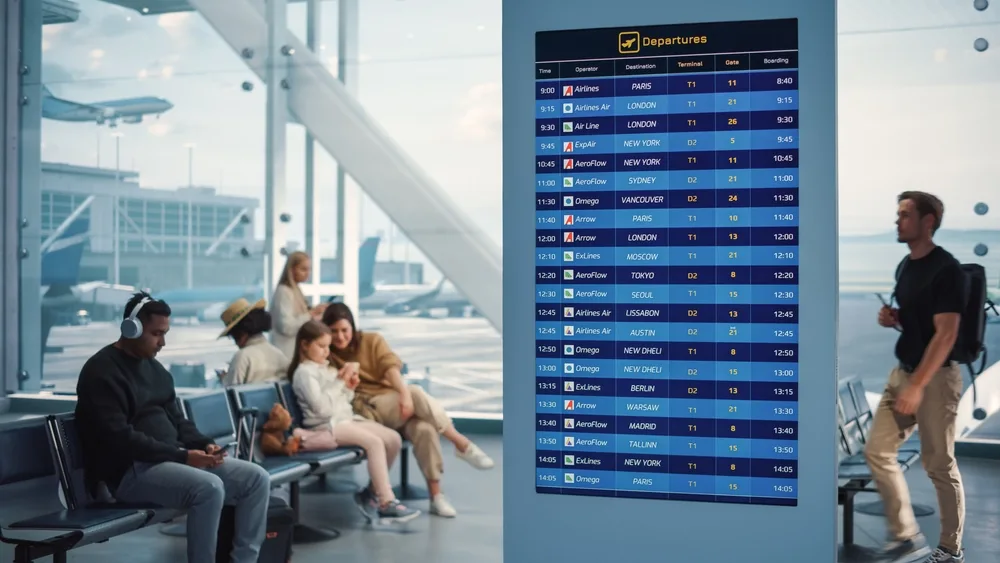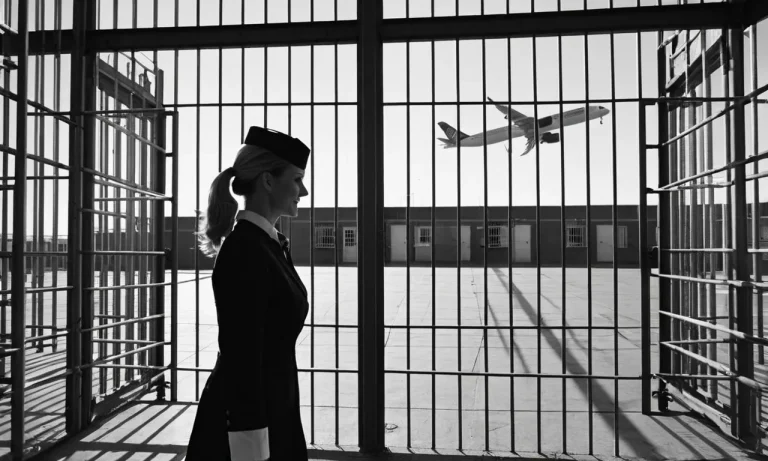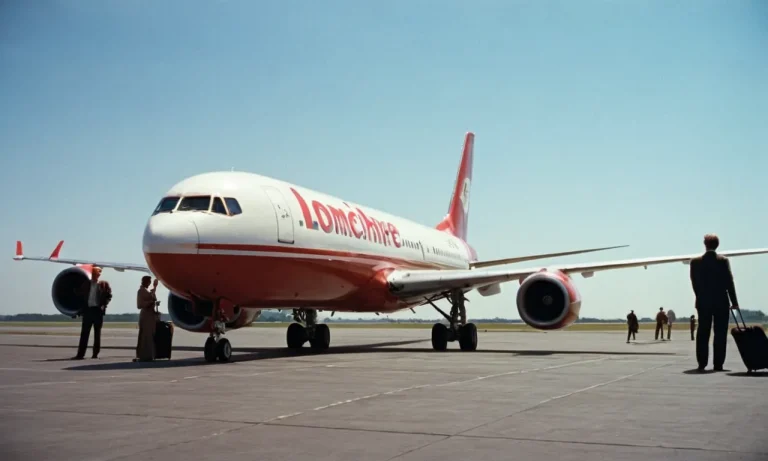Traveling can be stressful enough without having to worry about connecting flights on different airlines.
If you’re wondering how connecting flights work when booked separately or what happens if you miss your connection, you’ve come to the right place.
If you’re short on time, here’s the quick answer: Connecting flights on different airlines require you to collect your luggage and re-check it at each stopover.
You are responsible for making it to the next gate on time. If you miss your connection, the airlines are not obligated to rebook you.
In this comprehensive guide, we’ll cover everything you need to know about connecting flights when booked separately, including:
– How connecting flights work on different airlines
– Tips for booking smooth connections
– What to do if you miss a connection
– Your rights and airline responsibilities
– Expenses and compensation if something goes wrong
– Ways to make connecting flights less stressful
How Connecting Flights Work on Different Airlines
When it comes to connecting flights on different airlines, there are a few important things you need to know to ensure a smooth travel experience. Here’s a breakdown of how it all works:
You’re responsible for making your connections
Unlike when you have a connecting flight on the same airline, when you’re traveling with different airlines, you are responsible for making your own connections.
This means that you’ll need to plan your itinerary carefully and allow enough time between flights to make the switch.
It’s important to note that if you miss your connecting flight due to a delay or any other reason, the airline is not obligated to accommodate you on a later flight or provide any compensation.
Therefore, it’s crucial to give yourself ample time to make the connection.
You’ll need to collect and re-check your luggage
When you have connecting flights on different airlines, you will usually need to collect your checked luggage at your first destination and then re-check it for your next flight.
This means that you’ll need to go through the normal baggage claim process, and then proceed to the check-in counter to drop off your bags again.
It’s important to check with each airline to understand their specific baggage policies, as some may have different requirements or fees for re-checking your luggage.
Allow plenty of time to get to your next flight
Since you are responsible for making your connections, it’s crucial to allow plenty of time between flights to ensure you don’t miss your next flight.
Factors such as immigration and customs procedures, security checks, and distance between terminals can all affect the time it takes to get from one flight to another.
It’s generally recommended to allow at least a two-hour layover for domestic connections and a three-hour layover for international connections.
However, it’s always a good idea to check the minimum connection time requirements for the airports you’ll be traveling through.
Airlines won’t hold connecting flights for you
One important thing to keep in mind is that airlines typically won’t hold connecting flights if you’re running late.
If you don’t make it to the gate on time, the airline may proceed with the flight without you, and you’ll have to make alternative arrangements.
To avoid this situation, it’s best to plan your itinerary with ample time between flights and to stay informed about any delays or changes in your flight schedule.
Additionally, consider purchasing travel insurance that covers missed connections to provide some peace of mind.
Remember, when it comes to connecting flights on different airlines, it’s essential to be proactive, plan ahead, and allow yourself enough time to navigate through the process smoothly.
By doing so, you can ensure a stress-free travel experience.
Tips for Booking Smooth Connections
Leave at least 2 hours between flights
When booking connecting flights on different airlines, it’s important to allow for enough time between flights to ensure a smooth transition.
It is generally recommended to leave at least 2 hours between flights, especially if you have to go through customs, collect your luggage, and check-in again.
This will give you enough time to navigate the airport, go through security, and make it to your next gate without feeling rushed or stressed.
Try to book on the same airline alliance
Booking flights on the same airline alliance can greatly increase your chances of a smooth connection.
Airlines within the same alliance often have agreements in place to assist passengers with connecting flights, such as dedicated transfer desks, through check-in services, and priority boarding.
This can help streamline the process and minimize any potential hiccups during your journey.
Aim for connecting airports that are close together
Choosing connecting airports that are close together can also make your travel experience much easier.
Opting for airports with shorter transfer times can reduce the risk of delays and allow you more flexibility in case of unforeseen circumstances.
Additionally, connecting at airports with efficient transportation options, such as shuttle services or quick train connections, can save you time and make your journey more convenient.
Consider booking refundable tickets for more flexibility
If you’re concerned about potential flight delays or cancellations, it may be worth considering booking refundable tickets.
While these tickets are often more expensive, they offer greater flexibility in case your flights are disrupted.
This way, if you miss a connection or your first flight is delayed, you have the option to change your itinerary or get a refund without incurring additional costs.
Remember, when booking connecting flights on different airlines, it’s essential to plan ahead and take necessary precautions to ensure a smooth journey.
Following these tips can help minimize stress and increase your chances of a hassle-free connection.
What to Do If You Miss a Connection
Missing a connection can be a stressful experience, but knowing what steps to take can help minimize the inconvenience.
Here are some important things to do if you find yourself in this situation:
Inform airline staff immediately
As soon as you realize that you have missed your connection, it is crucial to inform the airline staff right away.
They are trained to handle such situations and can provide you with the necessary assistance. Look for a customer service desk or approach a gate agent to explain your situation.
Be sure to remain calm and polite, as this will increase the chances of receiving helpful support from the staff.
Ask about alternative flight options
Once you have informed the airline staff about your missed connection, inquire about alternative flight options.
Airlines often have contingency plans in place to accommodate passengers who miss their connections due to factors beyond their control, such as delays or cancellations.
The staff may be able to rebook you on the next available flight or provide you with other viable options.
Remember to remain open-minded and flexible as you explore these alternatives.
Get your luggage if it’s already checked through
If your luggage was checked through to your final destination, it is important to check with the airline staff to see if it can be retrieved.
In some cases, the airline may be able to retrieve your bags and make arrangements for them to be delivered to you at a later time.
However, if retrieving your luggage is not possible, the airline may assist you in tracking its whereabouts and ensuring its safe delivery to your final destination.
Keep all receipts for expenses incurred
If your missed connection results in unexpected expenses, such as accommodation, meals, or transportation, be sure to keep all receipts.
In certain circumstances, airlines may offer reimbursement for reasonable expenses incurred due to missed connections.
Having proper documentation will make it easier to submit a claim for reimbursement later on.
Remember to check the airline’s policy on reimbursement for missed connections to understand what expenses may be eligible for compensation.
Remember, missing a connection is not an ideal situation, but by following these steps and staying proactive, you can navigate the situation more smoothly.
It is also a good idea to familiarize yourself with the airline’s policies regarding missed connections before your trip, as this will help you understand your rights and options if such a situation arises.

Your Rights and Airline Responsibilities
When it comes to connecting flights on different airlines, it’s important to understand your rights as a passenger and the responsibilities of the airlines involved.
Here are some key points to keep in mind:
Airlines have no obligation to rebook you
If you miss a connecting flight on a different airline due to a delay or cancellation, it’s essential to know that the airline you’re traveling with has no obligation to rebook you on another flight.
This means that you may be left to find and pay for a new flight on your own.
You can request compensation for expenses
While airlines may not be obligated to rebook you, they may still be responsible for compensating you for certain expenses incurred due to missed connections.
This can include costs for accommodation, meals, and transportation.
However, it’s important to note that each airline has its own policies regarding compensation, so it’s crucial to familiarize yourself with these policies before your trip.
EU passengers have more protections than US flyers
If you’re a passenger traveling within the European Union, you have more protections when it comes to missed connections on different airlines.
Under EU regulations, passengers are entitled to compensation if they miss a connection due to a delay or cancellation of the first flight.
Check airline policies regarding missed flights
Before booking a flight with multiple airlines, it’s crucial to check each airline’s policies regarding missed connections.
Some airlines may have more lenient policies and be willing to assist passengers in finding alternative flights, while others may have stricter policies that leave passengers on their own.
Taking the time to research and understand these policies can save you a lot of stress and potential expenses in the long run.
Expenses and Compensation If Something Goes Wrong
Hotels, meals and essential purchases may be reimbursed
If you find yourself in a situation where your connecting flight on a different airline gets delayed or cancelled, you may be eligible for reimbursement of expenses such as hotels, meals, and essential purchases.
Airlines understand that these inconveniences can disrupt your travel plans and they often have policies in place to assist passengers during such situations.
Keep meticulous records if you want compensation
If you want to claim compensation for expenses incurred during a disrupted connecting flight, it is crucial to keep meticulous records of all your expenses.
This includes saving receipts for meals, hotels, transportation, and any other essential purchases you had to make as a result of the delay or cancellation.
These records will serve as evidence when you submit your claim to the airline.
It’s also important to note that some airlines may require you to submit your claim within a specific timeframe, so it’s best to check their policies and act promptly.
Remember, the more detailed and organized your records are, the higher your chances of receiving compensation for your expenses.
Be reasonable with additional expenses incurred
While airlines are generally willing to reimburse reasonable expenses, it’s important to be mindful of the expenses you incur during a disrupted connecting flight.
It’s unlikely that an airline will compensate you for extravagant purchases or luxury accommodations.
Instead, they will typically cover the cost of necessities that are directly related to the delay or cancellation.
For example, if you had to spend an extra night at a hotel due to a flight cancellation, it would be reasonable to expect the airline to cover the cost of a standard hotel room, rather than a luxury suite.
It’s always a good idea to exercise judgment and be reasonable when incurring expenses in such situations.
Compensation depends on many factors
The amount of compensation you may receive for a disrupted connecting flight on a different airline can vary depending on several factors.
These factors can include the length of the delay, the reason for the delay or cancellation, and the airline’s specific policies.
Some airlines may offer monetary compensation in addition to covering expenses, while others may provide vouchers or credits for future flights.
It’s important to familiarize yourself with the airline’s compensation policies before your trip so that you know what to expect in case of any disruptions.
Remember, each airline may have its own policies and procedures when it comes to handling disrupted connecting flights.
It’s always a good idea to check their websites or contact their customer service for the most accurate and up-to-date information.
Ways to Make Connecting Flights Less Stressful
Get lounge access if possible
One way to make your connecting flights less stressful is by securing lounge access. Many airlines offer lounge access to their premium passengers or those with certain credit cards.
Lounges provide a comfortable and quiet environment where you can relax, enjoy complimentary refreshments, and have access to Wi-Fi.
This can be especially beneficial during long layovers, allowing you to recharge and prepare for your next flight.
Check with your airline or credit card provider to see if you are eligible for lounge access.
Pack smartly and prepare for delays
When traveling on connecting flights, it’s important to pack smartly and be prepared for potential delays.
Ensure that your essential items, such as medications, electronics, and important documents, are packed in your carry-on bag.
This way, even if your checked luggage gets delayed or lost, you will still have the necessary items with you.
Additionally, pack a change of clothes and necessary toiletries in case of an extended delay or an overnight stay. Being prepared will help you navigate through unexpected situations with ease.
Have backup plans ready in case you misconnect
Despite careful planning, there might be instances where you miss your connecting flight. It’s essential to have backup plans ready in such situations.
Keep a list of alternative flights or airlines that can get you to your destination.
This way, if you miss your connection, you can quickly approach the airline staff and ask for assistance in rebooking your ticket.
Additionally, consider travel insurance that covers missed connections to provide financial protection in case you need to make alternative arrangements.
Stay calm and be polite to airline staff
It’s natural to feel frustrated or stressed when dealing with connecting flights. However, it’s important to stay calm and be polite to airline staff.
Remember that they are there to assist you, and being respectful can go a long way in resolving any issues you may encounter.
If you find yourself facing a delay or a misconnect, approach the airline staff with a positive attitude and ask for their guidance in finding a solution.
Showing appreciation for their assistance can often result in a more favorable outcome.
Conclusion
Connecting flights on different airlines require more preparation and effort on your part. With smart planning and a flexible attitude, you can minimize hassles and make your multi-stop trip go smoothly.
The key things to remember are: allow plenty of connection time, keep essentials in your carry-on, and be ready with backup plans in case things go awry.
While missed connections can be a headache, being informed about airline policies and your passenger rights will give you more confidence to travel efficiently through multiple airports and airlines.






